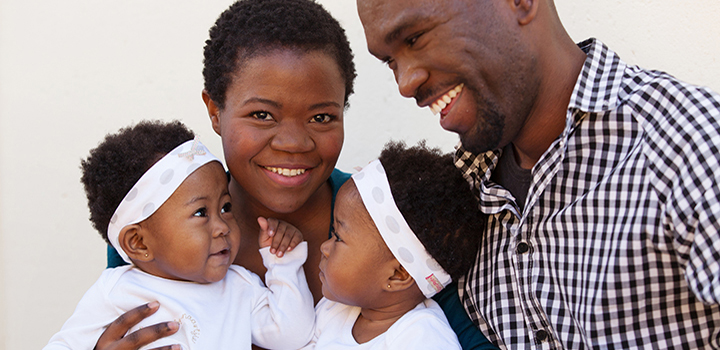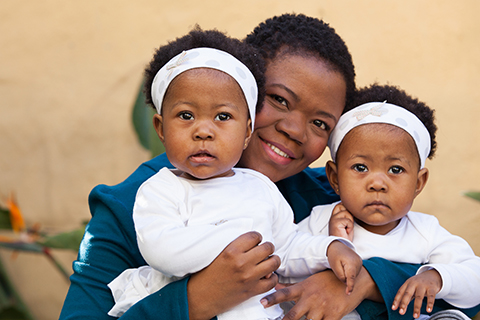You do know it is twins, right?

For Oratile and Tebo Tlhabane the news they were having a baby was a surprise. Then one baby became two.
Remembering the day they found out Tebo was pregnant, Oratile says, "After calling my wife, I had an uneasy feeling. She wasn't able to eat anything and was unwell."
When they went to see a doctor and Tebo explained her symptoms, the doctor immediately directed her to his table. Oratile recalls the doctor did a sonar and says it was like having a "window to your future". It was confirmed that Tebo was about six weeks pregnant.
Struck with surprise, they were elated to share the news that their first child, and the first grandchild in both families, was on the way.

From one baby to two
By January 2015, at 10 weeks of pregnancy, the Tlhabanes, who had started calling their little one "UNI", found a gynaecologist. The regular check-up they expected changed quickly with the words, "You know it's twins, right?" In the blink of an eye little "UNI" had company and evolved to "UNI2".
Tebo says she wasn't too taken aback by this news. "I had told my husband I thought it was twins." But Tebo found her pregnancy and expecting twins came with not only physical but also emotional challenges. Expecting multiple babies immediately places the
pregnancy in a high-risk category, and their gynaecologist made them aware of complications such as twin-to-twin transfusion (when one twin receives more blood than the other), pre-eclampsia (high blood pressure in pregnancy), gestational diabetes and premature labour.
Counting weeks not months
For Tebo and Oratile, each day was a milestone towards making it to 32 weeks of pregnancy. Although the babies would still need to be placed in intensive care if they were born then, at 32 weeks there are fewer chances of major complications.
Tebo was scheduled to have a caesarean as her doctor's view was it posed fewer risks. He first thought the twins were "mono-mono" ? identical babies in the same sac. But it turned out their girls were "mono di" ? identical twins in different sacs (which comes with fewer risks).
It was now time to set a date for the caesarean. At this point (week 36) their doctor was of the firm opinion that the benefits of keeping the babies in the womb for as long as possible far outweighed the risks.
Tebo's weekly appointments went well, but she also found them a bit frustrating. "Everything I complained about, such as breathlessness, headaches and hot flushes with an irregular heartbeat, and all-day 'morning sickness', were seen as normal for a twin pregnancy," she says. At the same time she was relieved knowing their girls were doing well.
Week 34 came and Tebo's blood pressure skyrocketed. She had no protein in her urine, but her doctor was worried about pre-eclampsia ? pregnancy-related high blood pressure that poses a danger to both mom and baby.
Tebo was immediately placed on treatment and monitored more closely. A week later, her blood pressure was back to normal and they could tick off another week of her pregnancy.
"Twins are awesome, but only once they're born."

The big day and time in NICU
Oratile and Tebo carefully chose the hospital where their twins would be delivered.
"Knowing I could leave my wife in the caring hands of staff at the Brenthurst Clinic helped to ease any anxiety I felt," he says. They checked in the night before and Tebo received steroids to speed up the development of the twins' lungs.
For Tebo the night felt long as she also experienced uncomfortable Braxton Hicks contractions (sporadic uterine contractions). The next morning she was taken for surgery and given a spinal block.
Oratile, in his theatre clothing, sat next to Tebo as they heard Oreneile, their firstborn, and then Oagile, starting to cry. "I thought, 'Just keep crying, my babies, so Mommy knows you're alright.'"
The proud new daddy was taking pictures and videos of the girls, when one of the nurses suddenly asked for help. "This one isn't crying properly; she has a lazy cry."
Tebo heard them encourage Oreneile to cry as they rushed her to the neonatal intensive care unit (NICU) to stabilise her. She had taken in some amniotic fluid. Tebo became panic-stricken and needed oxygen to ease her own anxious breathing.
Oreneile first spent five days in NICU. Tebo says, "Our little hero had to go back to NICU for another five days due to an infection a week after being discharged."
Looking back, Tebo and Oratile remember those as some of the toughest days of their lives. But fortunately the family had all their medical expenses fully covered. "Without agonising about bills, we could focus on taking care of our babies."
Discovery Health Medical Scheme, registration number 1125, is regulated by the Council for Medical Schemes and administered by Discovery Health (Pty) Ltd, registration number 1997/013480/07, an authorised financial services provider.
Related articles
5 excuses not to exercise (but are they good enough?!)
We can all think of a reason why we just can't fit a workout in today. But understanding how we justify it can help to break down barriers to exercise. Here we list some common excuses for avoiding exercise, and tips to get you going.
Sweat, but not the small stuff
While some people claim to be immune to stress, it is a normative condition. Without it, humans would not thrive or succeed in life. Dr Craig Nossel, Head of Vitality Wellness: The Sunday Times, 25 June 2017
Keep moving, or go extinct as Homo sedentary
Whether you take on the Comrades, are one of over 50 000 people doing a parkrun every Saturday, or enjoy the races running clubs put on every weekend - every single step counts. Dr Craig Nossel, Head of Vitality Wellness: The Sunday Times, 4 June 2017